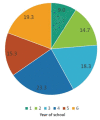Medical Students' Knowledge of Plastic Surgery as a Reflection of the Public Perception
- PMID: 35937440
- PMCID: PMC9352388
- DOI: 10.1055/s-0042-1749153
Medical Students' Knowledge of Plastic Surgery as a Reflection of the Public Perception
Abstract
Plastic surgery is a broad field that requires a mixed skillset. Therefore, it is important that students be exposed to all its various subspecialties to make informed career decisions and to properly refer patients in different clinical situations. A nationwide survey was conducted of Israeli medical students to investigate their knowledge and perceptions regarding the field of plastic surgery and its subspecialties, and the impact of a clinical rotation in plastic surgery on these factors. A total of 300 subjects responded. Approximately, 61% of the cohort was female and 70% were enrolled in a 6-year program. About one-third stated that their field of interest was surgical rather than medical. Significant variability was noted in the accuracy of responses to questions about different procedures encompassed in the scope of plastic surgery. Although 90% of the students were aware of some common plastic surgery procedures that are also often thought to be well known to the public, only 50% were able to correctly identify lesser-known surgeries performed by plastic surgeons. Knowledge about plastic surgery was unrelated to an interest in the field. We recommend adjusting preclinical instruction and clinical rotations in plastic surgery to better prepare students to select a specialty best suited to their future goals, as well as to improve their ability to refer patients to other specialists as necessary.
Keywords: career decision; direct exposure.; medical students' perceptions; patient referrals; plastic surgery.
Thieme. All rights reserved.
Conflict of interest statement
Conflicts of interest None declared.
Figures
Similar articles
-
Surgical Exploration and Discovery Program: Early Exposure to Surgical Subspecialties and Its Influence on Student Perceptions of a Surgical Career.J Surg Educ. 2019 Sep-Oct;76(5):1248-1257. doi: 10.1016/j.jsurg.2019.03.001. Epub 2019 Mar 20. J Surg Educ. 2019. PMID: 30904391
-
A Nationwide Study: Medical Students' Perceptions of Plastic Surgery and Its Role in Career Choice in Saudi Arabia.Cureus. 2024 Nov 12;16(11):e73542. doi: 10.7759/cureus.73542. eCollection 2024 Nov. Cureus. 2024. PMID: 39669819 Free PMC article.
-
Medical student perceptions of the scope of plastic and reconstructive surgery.Ann Plast Surg. 2013 Mar;70(3):343-9. doi: 10.1097/SAP.0b013e31823b6c19. Ann Plast Surg. 2013. PMID: 23038146
-
Factors Influencing Female Medical Students' Decision to Pursue Surgical Specialties: A Systematic Review.J Surg Educ. 2021 May-Jun;78(3):836-849. doi: 10.1016/j.jsurg.2020.08.050. Epub 2020 Sep 12. J Surg Educ. 2021. PMID: 32933885
-
Perceptions, awareness and influences of medical students towards plastic surgery: A systematic review.JPRAS Open. 2024 Apr 8;40:320-335. doi: 10.1016/j.jpra.2024.04.003. eCollection 2024 Jun. JPRAS Open. 2024. PMID: 38726047 Free PMC article. Review.
Cited by
-
Global perceptions of plastic surgery, suturing, and wound care among undergraduate medical students: A systematic review.JPRAS Open. 2025 Feb 26;44:259-268. doi: 10.1016/j.jpra.2025.02.013. eCollection 2025 Jun. JPRAS Open. 2025. PMID: 40235836 Free PMC article. Review.
References
-
- Kling R E, Nayar H S, Harhay M O. The scope of plastic surgery according to 2434 allopathic medical students in the United States. Plast Reconstr Surg. 2014;133(04):947–956. - PubMed
-
- Agarwal J P, Mendenhall S D, Moran L A, Hopkins P N. Medical student perceptions of the scope of plastic and reconstructive surgery. Ann Plast Surg. 2013;70(03):343–349. - PubMed
-
- Kim D C, Kim S, Mitra A. Perceptions and misconceptions of the plastic and reconstructive surgeon. Ann Plast Surg. 1997;38(04):426–430. - PubMed





